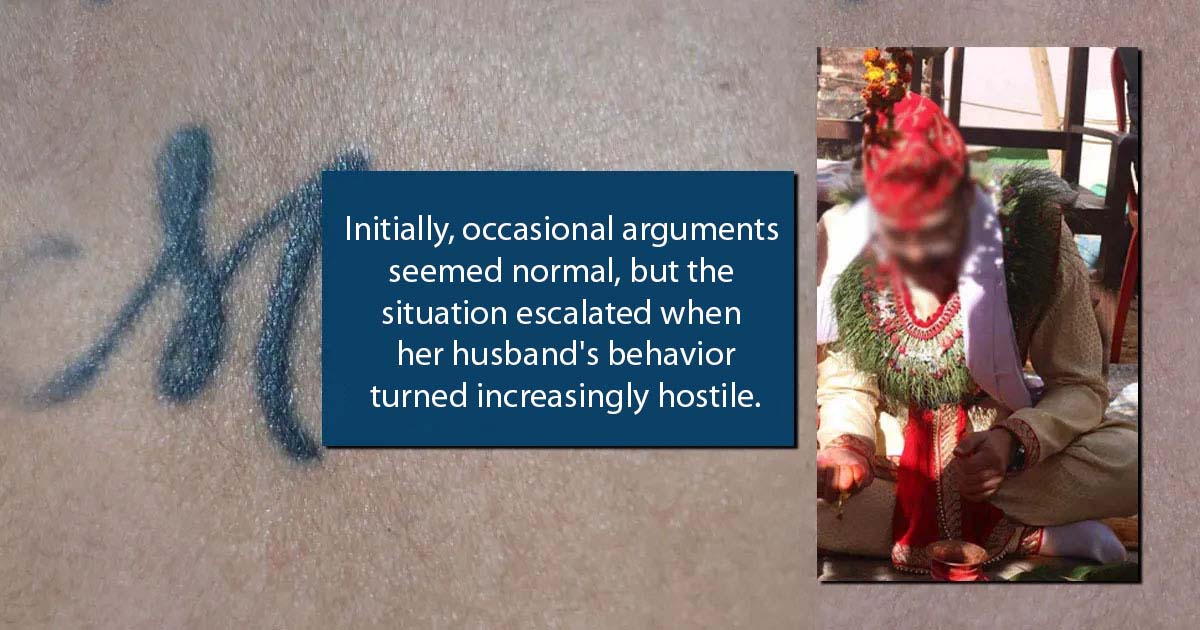KATHMANDU: Arpana Sharma (name changed), residing in Kaski, Pokhara, bears the burden of an unregistered marriage that took a shocking turn.
On December 11, 2020, she tied knot with M. Adhikari, and despite the absence of her in-laws due to the unconventional love marriage, the ceremony took place with grandeur before family and society.
Post-marriage, Arpana proposed registering their marriage, but plans to go abroad took precedence.
Her husband assured her that they would register the marriage while organizing other essential documents.
Unbeknownst to her, she refrained from pressing the matter, focusing on completing both her husband’s and her own graduation plans.
Upon returning to Kathmandu from Surkhet, their marital bliss took an unexpected downturn.
Initially, occasional arguments seemed normal, but the situation escalated when her husband’s behavior turned increasingly hostile.
What initially seemed like trivial misbehavior, such as breaking glass and tossing plates of rice, soon spiraled into more serious issues.
Shockingly, Arpana found herself a victim of physical abuse and isolation, with restrictions on talking to anyone and becoming a hostage within her own home.
The relationship that had once blossomed on Facebook had now left an indelible mark, not as a symbol of love, but in the form of an unexpected and painful tattoo.
Instead of offering empathy, they used threatening language, insisting that Arpana should endure the situation since she had chosen it willingly.
Even amidst the abuse inflicted by her husband, Arpana refrained from sharing her pain with anyone, instead internalizing the blame and sinking into depression.
She believed she deserved the mistreatment due to not obeying her parents and carried the weight of her suffering in silence, even concealing her longing for her parental home.
This couple’s connection began on Facebook in 2016, with their closeness growing through conversations.
At the time, Arpana was merely 17, and her partner was 19. In the span of five months, they met thrice, and during this period, the boy insisted on getting his name tattooed.
Although love existed, Arpana hesitated to permanently ink her boyfriend’s name, aware that a tattoo might complicate matters if the relationship soured.
Despite her reservations, the boyfriend persuaded her, arguing that if there was true love, a tattoo shouldn’t be an issue.
Reluctantly, she succumbed to pressure and had his name tattooed on her back.
Upon discovery, her brother scolded her, and her usually non-violent father reprimanded her.
Arpana, sharing her family’s disapproval, confided in Adhikari.
The suggestion to elope and marry arose, driven by the confusion of adolescence.
Believing her parents would object to the union, especially with the added complication of the tattoo, she fled with Adhikari, feeling compelled into marriage.
Despite the unconventional start, genuine love existed between them, evident in Arpana agreeing to the tattoo.
Adhikari’s sister helped them find a room in Sukedhara, Kathmandu.
The in-laws were displeased with their daughter’s impromptu decision, leading to a six-month silence between mother and daughter.
Eventually, realizing the need for formalization, her parent’s side decided to reconcile and support their marriage, overlooking the unconventional circumstances.
However, when the topic of marriage surfaced, Adhikari displayed a lack of interest.
The mother-in-law remained adamant that a marriage should occur with the full participation of their family to maintain a respectable image in society.
If this did not happen, the girl’s parent’s side was determined to salvage its reputation in the community.
Recognizing this, Arpana persistently proposed marriage. Yet, the boyfriend often feigned conflicts with his family or relatives.
Another crucial impediment was his age; he was not yet 20 years old, hindering the marriage process.
Shortly after cohabitating, the boy began subjecting Arpana to harassment.
Furthermore, when he callously stated, “It doesn’t matter if you die,” the pain inflicted by the tattoo of his name intensified.
Unable to endure the relentless abuse, Arpana detailed the events to her mother-in-law and mother, seeking support.
Progress toward foreign opportunities remained stagnant, and Arpana grew concerned about the lack of education and a reliable income.
However, they defended the boy, asserting that their son and brother were merely children.
Instead of offering empathy, they used threatening language, insisting that Arpana should endure the situation since she had chosen it willingly.
The father-in-law, a lawyer bearing both their expenses in Kathmandu, seemed to maintain an outward appearance of normalcy.
Despite his legal background, he supported his son’s actions and prohibited Arpana from seeking employment.
While everything seemed fine externally, the mental and physical torment inflicted by the boy caused Arpana to deteriorate emotionally.
The boy harbored an unusual ambition to become an artist, deceiving Arpana by promising to take her abroad for teaching opportunities.
They had planned to study there, explaining why Arpana had not pursued education after Plus Two.
In 2020, the girl’s side abandoned their family principles, with the boy aspiring to a future in the field of art. Arpana, however, yearned for foreign lands.
Despite being immature and caught in a storm of problems, the boy’s actions of marrying and having an affair with another girl earned disapproval even from his own family.
As the boy’s passion for art intensified, so did his anger, particularly toward a model from Chitwan.
Arpana discovered that the boy spent nights at a hotel under the pretext of project-related closeness.
The girl had evidence of their intimate conversations on Messenger.
Progress toward foreign opportunities remained stagnant, and Arpana grew concerned about the lack of education and a reliable income.
She devised a plan to gain control over her husband by revealing her intention to have a baby.
This tactic aimed to create complications for his work and studies abroad, serving her with dual benefits.
However, the boy consistently thwarted her plan by administering abortion pills each time.
Over time, the boy’s presence in their shared room dwindled, and one day, Arpana caught him red-handed in a girl’s room.
Following this revelation, the boy distanced himself from Arpana permanently.
Soon after, the boy’s family approached Arpana, informing her that their son had gone missing.
On the April 9, 2023, she filed a complaint reporting her husband’s disappearance.
The police arrived the next day, but the husband managed to escape through the back door, leaving only the girl in their custody.
She underwent detention and intense interrogation.
When she contacted her father-in-law, inquiring about the abrupt halt in financial assistance, he callously remarked that they disliked each other and should stay apart.
Attempting to seek support from her mother-in-law in Surkhet, Arpana revealed her son’s actions.
However, her mother-in-law callously advised that the daughter-in-law should endure whatever the husband does, asserting that he, having married willingly, couldn’t even seek refuge with his wife.
Despite being immature and caught in a storm of problems, the boy’s actions of marrying and having an affair with another girl earned disapproval even from his own family.
Arpana, unable to bear the pressure from all sides, sank into depression.
Encouraging the other woman involved with her husband to report the matter to the authorities, Arpana found herself witnessing the repercussions of their wrong decisions as the boy’s family embraced the new girl.
Following these events, Arpana sent her uncles to separate fact from fiction.
However, the boy insisted that their meetings were merely part of a theatrical context.
On April 16, 2023, she found herself in a room at Sukedhara, her sister abruptly taking away all belongings, citing her brother’s intention to shoot.
Financial support from home ceased, and the mother-in-law seemed unreachable.
When she contacted her father-in-law, inquiring about the abrupt halt in financial assistance, he callously remarked that they disliked each other and should stay apart.
Left with no resources and unable to find sustenance in her room, Arpana was compelled to return to her parent’s home.
The boy, who had chased Arpana away to take her abroad, had gone overseas with another girl, pushing her into a semi-conscious state.
Her husband reached out while she was there, expressing a desire for a face-to-face discussion.
To her surprise, he declared that he wanted a divorce, abruptly ending the vow they had made to live and die together.
At such a tender age, she grappled with the reality that he had treated their commitment as a fleeting indulgence.
He claimed to have used it as long as he pleased and now sought a departure.
Arpana, in defiance, asserted that she would not be left behind as a mere toy.
She fell ill due to the incessant day and night fights. During this challenging time, the boy’s uncle was contacted by Arpana’s uncle, urging him to sit down and discuss the matter.
The uncle, claiming to be unwell, postponed the meeting until he felt better.
Subsequently, the boy’s uncle communicated with the girl’s uncle, informing him of Arpana’s recent illness.
In the midst of this, Arpana received news of the boy going abroad.
The destination remained unknown, with rumors circulating about America or the UK.
The father-in-law, proudly claiming his son’s departure to America, retrieved belongings and even left the wedding dress behind.
However, Arpana now carries the burden of an unregistered marriage, lacking proof of being the wife of a specific person, and not being considered single.
They cut a photo of their wedding, adorned with a garland, and discarded half of it in the trash.
Upon the family’s counsel, it was revealed that the boy and the girl were cohabiting in a flat in Anamnagar.
While there was no legal basis for a married man to live with another woman without divorce, they persisted in doing so.
Arpana only learned about their true character after three months.
The boy, who had chased Arpana away to take her abroad, had gone overseas with another girl, pushing her into a semi-conscious state.
The realization that her life had become a storyline reminiscent of a cinema added to her pain.
The father-in-law and mother-in-law repeatedly discussed divorce, yet no formal response was provided.
Arpana argued that since the marriage was not registered, a legal divorce was unnecessary.
She contended, “Even if the marriage is not registered, they are married in front of society, and divorce should be granted based on that.”
However, Arpana now carries the burden of an unregistered marriage, lacking proof of being the wife of a specific person, and not being considered single.
The tattoo of the person’s name further complicates matters.
She accuses her husband of abandoning her in a life-or-death situation, objectifying her.
Arpana is distressed that the quest for justice is overshadowing the innocent love they shared for six years.









Comment